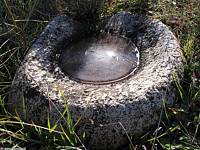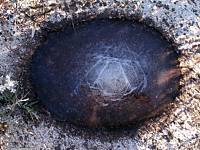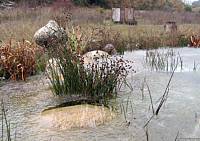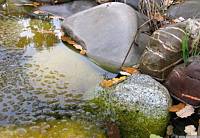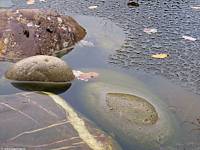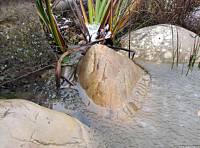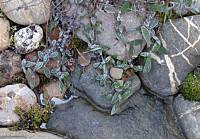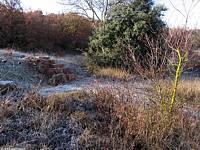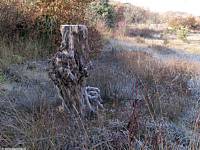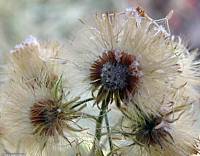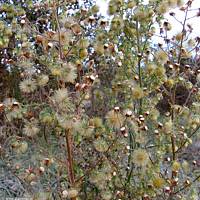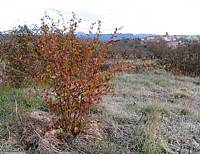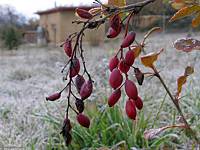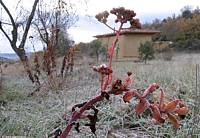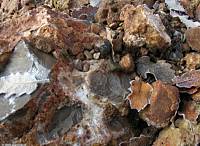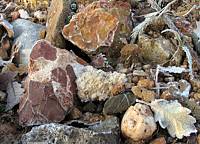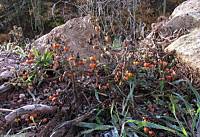|
|
Nature
Switched On
in the Pyrenees the first 10 years |
|
|
|
introduction |
2010 November 29 to December 13 A kind of miniature pond this drinking trough for birds. Nonetheless, the spectacle of the freezing up and the thawing of the water is as interesting as in the bigger ponds. It all depends on the beholder's eye. |
Granite drinking trough for birds, in front of the house. |
|
|
Especially when the freezing comes together with snow or icy rain, the appearance of the pond surface is quite unpredictable and always changing.
|
|||
| Upper
pond, after some snow and icy rain. 30 Nov 12:12 |
Lower pond. 30 Nov 12:29 |
||
| Upper
pond. 30 Nov 12:14 |
Lower pond. 30 Nov 12:28 |
||
|
Hieracium pilosella with long frozen hairs and some Veronica
beccabunga in the filter pond. 3 Dec 12:47
|
The ice on the ponds in the southern extreme of the zone often melts during the day, but the pond near the greenhouse (used for filtering grey water) is mostly in the shadow now and usually stays frozen. |
||
| Filter
pond. 13 Dec 11:26 |
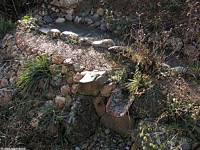 |
The water has still got a milky colour (as we continue to use the washing machine and the solar shower) and the filtering agents have probably gone to hibernate; still being the question if there are any agents at all. Moss is quite proliferating though. | |
|
An impression of the structures that were set up recently, from another angle and with different light conditions. |
|||
|
Stairs made from debris on the left, Cornus sanguinea,
covered with yellow lichen, on the right. 13 Dec 10:56 |
Old olive trunk, in the centre
of the zone. Looking west. 13 Dec 10:58 |
||
|
Eri-geroon is Greek for early grey-haired and like
his cousin Erigeron acer, this Erigeron
canadiense certainly has a lot of grey hairs. More colourful are the autumn leaves and fruits of Berberis vulgaris, still showing off in the frosty landscape:
Like Iris germanica, Sparganium
erectum and also Lactuca serriola, I have recently
become to appreciate the capricious
|
|||
|
Fruiting Erigeron canadiense. The empty receptacles look like African congas. 29 Nov 9:41 |
Close up of Erigeron
canadiense seeds on the receptacle. 29 Nov 9:44 |
||
|
Berberis vulgaris in the north corner of the zone. There are 5 plantings of which the ones with straw flakes grow clearly best. 29 Nov 9:46 |
Close up of the Berberis
vulgaris berries. Looking south. 29 Nov 9:48 |
||
|
Sedum telephium still
trying to develop some flowers. At the back on the left another
plant. 29 Nov 9:55 |
|||
|
|
In the rock corner I cleared away some of the Portuguese Oak (Quercus faginea) shrubs on the south-west side, providing much more light, especially in winter. |
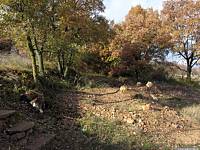 The traditional macro images from this corner of the zone feature some impressions of the stones. All of the rocks and stones of this area come from a building site in the nearby village and are mostly made up of hard conglomerate. They are surprisingly varied and form a nice substrate for the rock plants, at least in an aesthetic way. Let's see what plant life will do with it. |
Rock corner. Much more sunlight penetrates now through the oaks on the left, where also new stone stairs can be seen. 2 Dec 12:38 |
|
Dry oak leaves mingle graciously with the conglomerate stones. 13 Dec 9:43 and 9:30 resp. |
|||
|
This would perhaps be my kind of Christmas tree, although |
|||
|
Solanum villosum on the
stone heap near the solar panels. 13 Dec 11:19 |
|||
|
introduction
|
|
||
